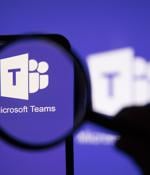Security News

The Qbot botnet is now spewing U.S. election-themed phishing emails used to infect victims with malicious payloads designed to harvest user data and emails for use in future campaigns. "In addition to stealing and exfiltrating data from its victims, QBot will also start grabbing emails that will later be used as part of the next malspam campaigns," Malwarebytes' Jérôme Segura and Hossein Jazi explain.

A creative Office 365 phishing campaign has been inverting images used as backgrounds for landing pages to avoid getting flagged as malicious by crawlers designed to spot phishing sites. This tactic has been used by several Office 365 credential phishing sites according to WMC Global analysts who spotted while being deployed as part of the same phishing kit created and sold by a single threat actor to multiple users.

For attackers, it's almost a no-brainer: phishing is cheap and humans are fallible, even after going through anti-phishing training. That's why defenders must preempt attacks, he says, and reinforce a lesson during a live attack.

Cellusys pioneers the use of zero trust security to help their 800 million mobile phone end users combat SMS phishing and fraud. Cellusys has partnered with internet security firm MetaCert to provide an SMS security solution, using zero trust methodology to combat cyberattacks such as phishing, malware and financial fraud.

Attackers are compromising email accounts from popular universities, including Purdue and Oxford, to launch attacks that get around DMARC and SPF. Cybercriminals are hijacking legitimate email accounts from more than a dozen universities - including Purdue University, University of Oxford in the U.K. and Stanford University - and using the accounts to bypass detection and trick victims into handing over their email credentials or installing malware. The highest number of phishing emails detected came from compromised Purdue University accounts, stolen in campaigns from Jan. to Sept. Behind Purdue University was Oxford, Hunter College and Worcester Polytechnic Institute.

A report published Thursday by security firm Barracuda Networks details how schools are being hit by phishing emails and what they can do to better protect themselves. Schools and colleges have been preyed on by specific types of phishing campaigns, including spear phishing and Business Email Compromise attacks.

Researchers are warning of a phishing campaign that pretends to be an automated message from Microsoft Teams. The initial phishing email displays the name "There's new activity in Teams," making it appear like an automated notification from Microsoft Teams.

SlashNext announced the on-device AI mobile phishing defense for iOS and Android with natural language and link-based detection to protect users from the exponential increase in mobile-based SMS phishing attacks. Now SlashNext, customers and partners can benefit from the industry's fastest and most accurate, 2.0 mobile AI phishing defense, protecting users from all forms of phishing across all their communication channels - SMS, email, social networking, gaming, collaboration and search - without compromising user privacy or performance.

Amazon, Apple, Netflix, Facebook and WhatsApp are top brands leveraged by cybercriminals in phishing and fraud attacks - including a recent strike on a half-million Facebook users. Facebook has been a top cybercriminal favorite in phishing attacks so far this year, with recent research shedding light on 4.5 million phishing attempts that have leveraged the social media platform between April and September 2020.

A new phishing campaign uses a Coinbase-themed email to install an Office 365 consent app that gives attackers access to a victim's email. Over the past year, hackers have increasingly used Microsoft Office 365 OAuth apps, otherwise known as consent apps, as part of their attacks.